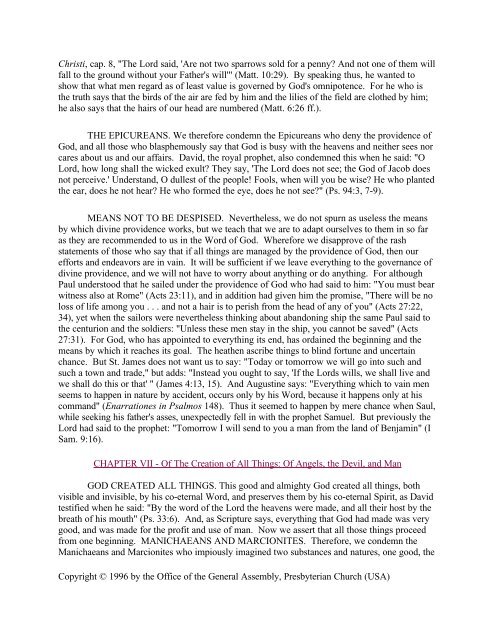The Book of Confessions - The Presbyterian Leader
The Book of Confessions - The Presbyterian Leader
The Book of Confessions - The Presbyterian Leader
Create successful ePaper yourself
Turn your PDF publications into a flip-book with our unique Google optimized e-Paper software.
Christi, cap. 8, "<strong>The</strong> Lord said, 'Are not two sparrows sold for a penny? And not one <strong>of</strong> them will<br />
fall to the ground without your Father's will'" (Matt. 10:29). By speaking thus, he wanted to<br />
show that what men regard as <strong>of</strong> least value is governed by God's omnipotence. For he who is<br />
the truth says that the birds <strong>of</strong> the air are fed by him and the lilies <strong>of</strong> the field are clothed by him;<br />
he also says that the hairs <strong>of</strong> our head are numbered (Matt. 6:26 ff.).<br />
THE EPICUREANS. We therefore condemn the Epicureans who deny the providence <strong>of</strong><br />
God, and all those who blasphemously say that God is busy with the heavens and neither sees nor<br />
cares about us and our affairs. David, the royal prophet, also condemned this when he said: "O<br />
Lord, how long shall the wicked exult? <strong>The</strong>y say, '<strong>The</strong> Lord does not see; the God <strong>of</strong> Jacob does<br />
not perceive.' Understand, O dullest <strong>of</strong> the people! Fools, when will you be wise? He who planted<br />
the ear, does he not hear? He who formed the eye, does he not see?" (Ps. 94:3, 7-9).<br />
MEANS NOT TO BE DESPISED. Nevertheless, we do not spurn as useless the means<br />
by which divine providence works, but we teach that we are to adapt ourselves to them in so far<br />
as they are recommended to us in the Word <strong>of</strong> God. Wherefore we disapprove <strong>of</strong> the rash<br />
statements <strong>of</strong> those who say that if all things are managed by the providence <strong>of</strong> God, then our<br />
efforts and endeavors are in vain. It will be sufficient if we leave everything to the governance <strong>of</strong><br />
divine providence, and we will not have to worry about anything or do anything. For although<br />
Paul understood that he sailed under the providence <strong>of</strong> God who had said to him: "You must bear<br />
witness also at Rome" (Acts 23:11), and in addition had given him the promise, "<strong>The</strong>re will be no<br />
loss <strong>of</strong> life among you . . . and not a hair is to perish from the head <strong>of</strong> any <strong>of</strong> you" (Acts 27:22,<br />
34), yet when the sailors were nevertheless thinking about abandoning ship the same Paul said to<br />
the centurion and the soldiers: "Unless these men stay in the ship, you cannot be saved" (Acts<br />
27:31). For God, who has appointed to everything its end, has ordained the beginning and the<br />
means by which it reaches its goal. <strong>The</strong> heathen ascribe things to blind fortune and uncertain<br />
chance. But St. James does not want us to say: "Today or tomorrow we will go into such and<br />
such a town and trade," but adds: "Instead you ought to say, 'If the Lords wills, we shall live and<br />
we shall do this or that' " (James 4:13, 15). And Augustine says: "Everything which to vain men<br />
seems to happen in nature by accident, occurs only by his Word, because it happens only at his<br />
command" (Enarrationes in Psalmos 148). Thus it seemed to happen by mere chance when Saul,<br />
while seeking his father's asses, unexpectedly fell in with the prophet Samuel. But previously the<br />
Lord had said to the prophet: "Tomorrow I will send to you a man from the land <strong>of</strong> Benjamin" (I<br />
Sam. 9:16).<br />
CHAPTER VII - Of <strong>The</strong> Creation <strong>of</strong> All Things: Of Angels, the Devil, and Man<br />
GOD CREATED ALL THINGS. This good and almighty God created all things, both<br />
visible and invisible, by his co-eternal Word, and preserves them by his co-eternal Spirit, as David<br />
testified when he said: "By the word <strong>of</strong> the Lord the heavens were made, and all their host by the<br />
breath <strong>of</strong> his mouth" (Ps. 33:6). And, as Scripture says, everything that God had made was very<br />
good, and was made for the pr<strong>of</strong>it and use <strong>of</strong> man. Now we assert that all those things proceed<br />
from one beginning. MANICHAEANS AND MARCIONITES. <strong>The</strong>refore, we condemn the<br />
Manichaeans and Marcionites who impiously imagined two substances and natures, one good, the<br />
Copyright © 1996 by the Office <strong>of</strong> the General Assembly, <strong>Presbyterian</strong> Church (USA)




